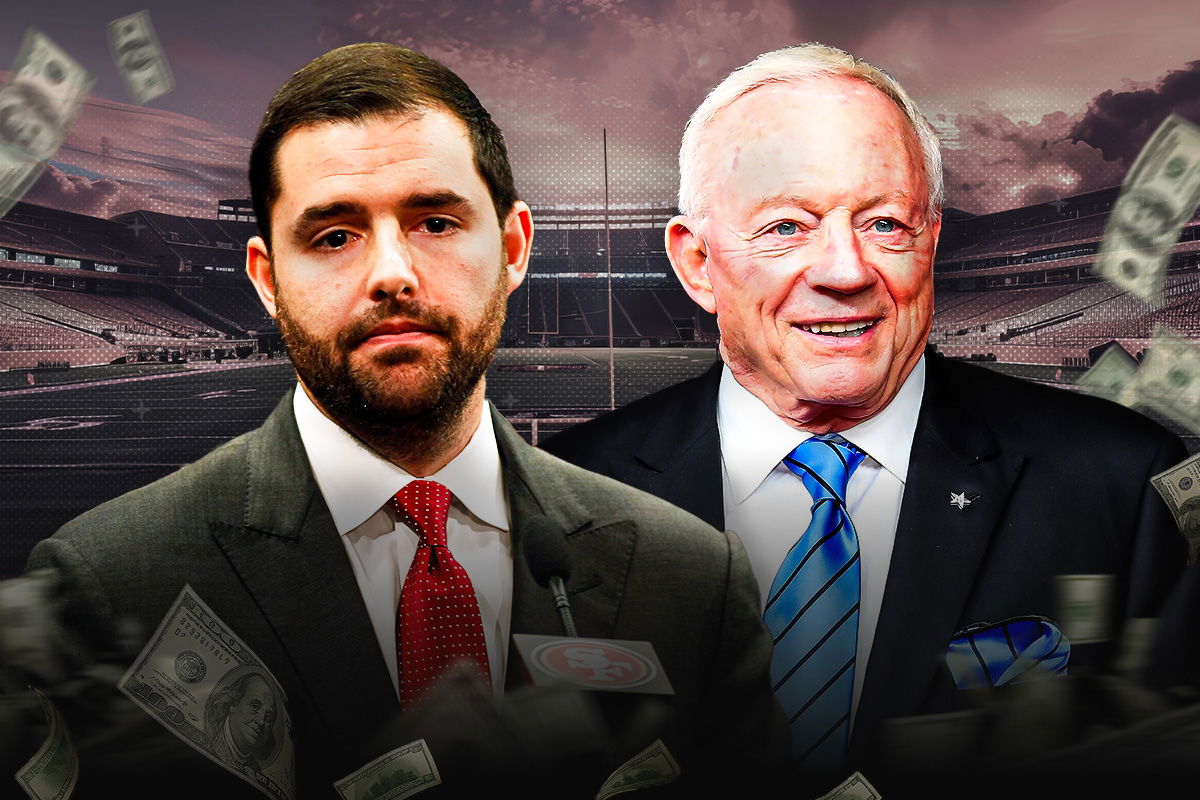
Imago
Image Credits: IMAGO

Imago
Image Credits: IMAGO
At the gate, the San Francisco 49ers charge extra. Their fans gladly pay for it. The Niners regularly surpass clubs like the Dallas Cowboys in gate earnings, with an average ticket price of $161, which is the second-highest in the NFL after the Raiders. And yet, for all the buzz inside Levi’s Stadium on game day, the real financial superpower in the NFL isn’t in the Bay Area. In suburban Arlington, Texas, a team that earns $40 million less in gate receipts than the 49ers continues to outperform all other sports teams in terms of overall profit. But what about America’s Team?
Watch What’s Trending Now!
The Dallas Cowboys are the world’s most profitable team. According to Forbes, the Cowboys earned an incredible $564 million in operational income in 2023, much above the $286 million earned by the Los Angeles Rams, and the New England Patriots earned $261 million. Not a single other NFL team was remotely close. Additionally, the Cowboys generated around $800 million in local revenue, which is more than twice that of any other NFL team. So, why are the Cowboys leaving gate money on the table?
Well, it’s because they have already created a money-printing machine. And the secret lies in how the NFL shares revenue, how brands bend for the star, and how Jerry Jones turned the stadium itself into a business empire.
ADVERTISEMENT
Gate revenue isn’t the NFL’s gold standard; shared media is
Each of the 32 NFL teams receives an equal share of the league’s about 65% total income. This covers league-wide sponsorships, streaming rights, and national broadcast agreements. In actuality, that implies that regardless of ticket pricing or fan attendance, every team in 2024, from the Cowboys to the Bengals, was anticipated to earn roughly $357 million in shared revenue. Surprisingly, gate revenue is also shared in part. After league commitments and venue costs, host teams receive only 66% of ticket sales, with about 34% going to the pool.
So, what does that mean? Because of the NFL’s socialist-by-design economics, a team like the 49ers may have a higher per-ticket price and generate more income on game day. Their gate revenue reportedly surpassed the Cowboys by around $40 million in 2023, but that advantage has little effect on bottom-line profitability.
ADVERTISEMENT
Got my hands on the #NFL Blue Book (league ticket report) for 2024 season. Top 5 teams in net ticket revenue (including club seats) for regular and preseason:
49ers: $176.5M
Cowboys: $135.7M
Eagles: $130.4M
Broncos: $128.9M
Raiders: $128.5M— Mike Ozanian (@MikeOzanian) June 17, 2025
ADVERTISEMENT
Cowboys don’t need the gate; they make money everywhere else
If ticket stubs aren’t the main moneymaker, what is? It’s everything else for Dallas. Thanks to their expertise in naming rights, premium suites, venue monetization, merchandising, and hyper-local sponsorships, the Cowboys led the globe in local revenue with around $800 million. And Jones entirely owns and privately finances AT&T Stadium. As a result, the Cowboys have an unparalleled capacity to make money from events, concerts, fan zones, upscale hospitality, and more.
Top Stories
Amanda Balionis Confirms New Relationship Ending Months of Rumors

Dan Campbell Confirms Final Stance on Jared Goff Trade, Announces if He’ll Fire Lions Coach

“Rest in Peace”: Condolences Pour In as Legendary Coach Freddie Roach Mourns Personal Loss

Ryan Day’s Two Major Calls Backfire as Ohio State Fans Demand Urgent Change

Andy Reid Announces Travis Kelce’s Immediate Future After Confirming Stance on Chiefs Exit

Brock Purdy’s Former Backup Breaks Down Plays That Prove He’s Worth His $55M 49ers Contract

And in contrast to teams that share real estate (such as the Giants and Jets at MetLife), the Cowboys do not divide the spoils. Plus, the Cowboys are both a landlord and a star tenant, in contrast to the Chargers, who rent from the Rams at SoFi. Huge margins result from that autonomy.
Moreover, brand value is also important. In 2024, CNBC valued the Cowboys at $11 billion, which was $3 billion more than the next closest NFL team. No team has ever surpassed the $10 billion mark before. Elite alliances and massive sponsorships brought about by that brand strength far outweigh traditional ticket sales.
ADVERTISEMENT
The 49ers charge more than the Cowboys, and they should
To be clear, when it comes to revenue, the 49ers are no slouch. They have established one of the most robust game-day ecosystems in sports, with a $7.4 billion valuation and ticket prices that consistently place in the top three in the NFL. Premium experiences at Levi’s Stadium and a willing fan base support the average ticket price of $161. The 49ers are a gate income powerhouse and likely part of the reason they cleared $687M in annual revenue.
However, there is a limit to this concept. Teams like the 49ers will always be chasing the shadow of a team that monetized every inch of its brand, not just the stands, if they don’t have control over stadium events throughout the year or make extra money from sponsorships outside of the NFL pool.
ADVERTISEMENT
Jerry Jones bet on the Cowboys’ ownership, not attendance
This isn’t a coincidence. After viewing the NFL’s plan several decades ago, Jerry Jones decided to revise it. Jones made local deals with American Express and Pepsi in the 1990s, when the league standardized sponsorships with Visa and Coca-Cola. This was against the rules, but it opened up new cash streams. Although it earned him heat at the time, it also paved the way for the Cowboys to become a leader in sponsorship.
That same spirit still guides their actions now. The Cowboys chase exclusive monetization rights, while other teams aim for sellouts. While some teams rely on winning the Super Bowl, Dallas depends on taking charge of its own financial future. So, yes, the Cowboys may earn less at the gate than the 49ers. But that’s a number they’ll gladly eat for the right to own every other number that matters.
ADVERTISEMENT
ADVERTISEMENT
ADVERTISEMENT
ADVERTISEMENT

